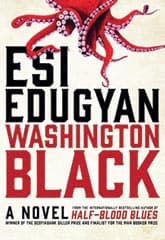Washington Black
Critique • Quotes
 First edition
First editionFirst publication
2018
Literature form
Novel
Genres
Literary, historical
Writing language
English
Author's country
Canada
Length
Approx. 130,000 words
Beyond slavery
Admit it. Books on certain heavy, unimaginably tragic themes are picked up with some reluctance, however Great and Important they are said to be. Do we really need to go through slavery, the Holocaust, or the genocide of native peoples any further? We already know these were horrible events, we've drawn the lessons and we're prepared to oppose any recurrence.
Yet once we're deep into such a book, we find we're glad we stuck with it. Invariably it proves worthy—moving—revealing the shallowness of our previous understanding. Capable of teaching us something new each time.
Published in 2018, Esi Edugyan's Washington Black was the latest in a wave of novels on the North American slave experience. Within just the previous two decades had appeared such tremendous works as Austin Clarke's The Polished Hoe (2002), Lawrence Hill's The Book of Negroes (known in the US as Someone Knows My Name, 2007), and Colson Whitehead's The Underground Railroad (2016), to name just a few.
New territory
Washington Black shares elements with these and earlier books, starting with the horrors of life and death on a slave plantation (in this case in Barbados, oddly coincidental with Clarke's work), following with an attempt to fight back or escape, a chase, and eventual emergence into enlightened freedom.
But along the way, Edugyan's story veers off into unexpected narrative territory. At times it reads like Jules Verne's fantastic voyages, complete with an obsessed scientist, a balloon flight, a sea cruise and fights for survival. The artistic skills of the escaped slave, George Washington (Wash) Black, lead to his involvement in studying marine biology. His work and personal relationships take him across the map—to Virginia, the Arctic, Nova Scotia, England, and Morocco. Washington Black becomes an adventure story.
Yet Wash continues to face racial discrimination and his former slave life can never be entirely forgotten. Through much of the story, Wash is tracked by a bounty hunter for the slave owner. This provides some of the suspense of the tale, but surprisingly little. When the hunter is finally disposed of, it comes as a bit of an anti-climax. We've become too deeply involved in Wash's current life, relationships and work—miles from his past as a slave boy—to feel more than a slight relief at his old antagonist's end.
Of greater emotional impact are revelations years later about the motherly slave Big Kit whom he left behind on the plantation and about his white benefactor and science mentor Titch who eventually left him behind—discoveries that cause him to reinterpret his earlier experiences.
For Edugyan, personal relationships are the focus of this story, challenging the impersonal way slavery is often depicted in our history books.
— Eric
Critique • Quotes

